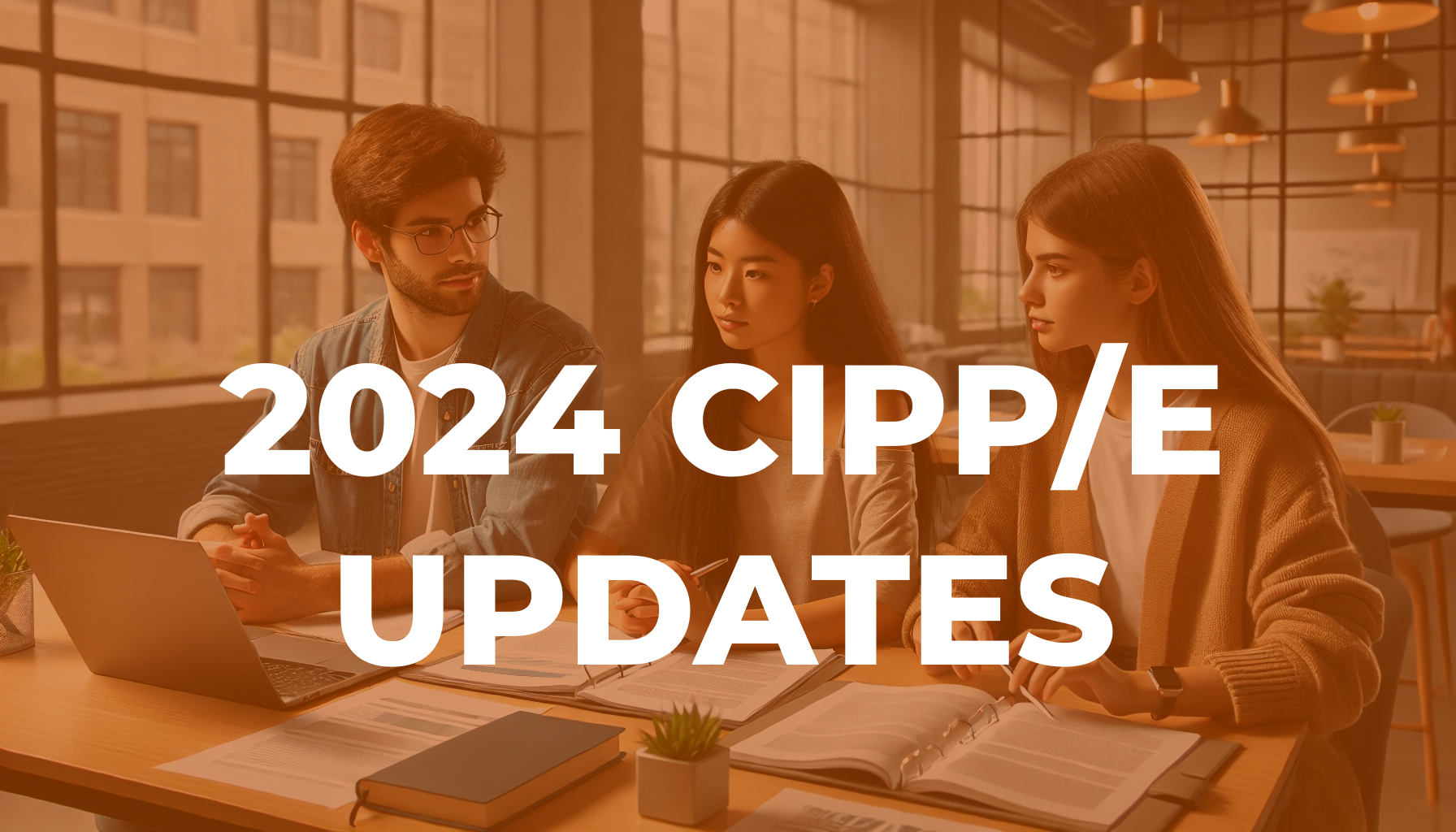2024 CIPP-E Updates
The Certified Information Privacy Professional/Europe (CIPP/E) certification is a cornerstone for privacy professionals working within the EU framework. As privacy laws evolve and new technologies emerge, staying informed about updates is critical for success. This year, the CIPP/E curriculum has incorporated changes that reflect shifts in European Union regulations, international data transfer mechanisms, and the rapid advancement of technology. While these updates are not drastic, they are essential for candidates to understand, especially in the context of how these evolving regulations interact with the GDPR. 22Academy continuously updates its courses to ensure that candidates are prepared with the latest information. Since the CIPP/E certification serves as a foundation for other privacy certifications and the GDPR underpins many global privacy laws, staying up-to-date is crucial for ongoing professional development.
Legislative Framework
So, what has changed? Let’s start with the first domain, which has gained increased importance due to emerging regulations that closely interact with the GDPR. Among these is the EU Data Act, which aims to regulate data access and sharing across the EU, promoting a more data-driven economy. Another critical addition is the EU AI Act, recently adopted and set to be implemented in phases. This regulation seeks to ensure that AI systems used within the EU adhere to strict guidelines, particularly concerning transparency, risk management, and accountability.
The NIS2 Directive also features prominently in the updated curriculum. This directive enhances cybersecurity measures across the EU, mandating stricter controls for entities operating critical infrastructure. Additionally, the ever-changing UK GDPR landscape continues to be relevant post-Brexit, with potential reforms on the horizon that could reshape the UK's data protection regime. Moreover, the adequacy decision for the UK, which allows for the free flow of personal data between the EU and the UK, is set for its periodic review in 2025, further emphasizing the importance of this area.
An increased focus on these new regulations means more exam questions related to this domain. It is essential to understand how these laws interact with the GDPR, as they collectively form the backbone of EU data protection and cybersecurity. For example, Convention 108+, an updated version of the Council of Europe's Convention 108 on data protection, is gaining more prominence. This international treaty, which aligns with GDPR principles, reinforces the global standards for data protection and is an essential part of the CIPP/E exam. Candidates should be aware of the interplay between these laws and how they complement or challenge existing GDPR frameworks.
International Data Transfers
International data transfers remain a complex and evolving area within privacy law, and the curriculum has been updated to reflect recent changes. One of the most notable updates is the shift to the EU-US Data Privacy Framework (DPF), which governs data transfers between the EU and the US. This framework, still subject to ongoing adjustments, replaces the Safe Harbor and Privacy Shield agreements, both of which were invalidated by the European Court of Justice in past rulings. The EU-US DPF aims to address concerns raised by these rulings, particularly around the protection of European citizens' data when transferred to the US.
These changes highlight the ongoing negotiations and legal challenges surrounding transatlantic data flows. While the curriculum reflects these developments, it also maintains a focus on the fundamental principles of international data transfers, such as the need for adequate safeguards and the importance of mechanisms like Standard Contractual Clauses (SCCs) and Binding Corporate Rules (BCRs).
In addition to these updates, there is a slight shift in the curriculum's emphasis within this second domain. While understanding the GDPR principles and legal bases for processing data remains critical, there is now more attention on the security and accountability aspects of data processing. This includes ensuring that organisations implement robust security measures and can demonstrate compliance with GDPR requirements, particularly when transferring data across borders. Conversely, less emphasis is placed on the roles of supervisory authorities and enforcement mechanisms in this area, though they remain important for a holistic understanding of GDPR compliance.
Employment Data and Surveillance: Navigating Emerging Risks
The management of employment data and surveillance activities has always been a critical aspect of privacy regulation, and the CIPP/E curriculum reflects the growing complexities in this area. Employment data, especially in the digital age, is becoming increasingly vulnerable to misuse, particularly through social media platforms and emerging AI systems. These systems can analyze vast amounts of employee-related data, raising concerns about privacy and the potential for surveillance beyond the workplace. The curriculum emphasizes the need for privacy professionals to understand these risks, ensuring that they can guide organisations in implementing policies that protect employee data in compliance with GDPR and other relevant laws.
In this same domain, the topic on surveillance activities has also been updated, particularly with the introduction of Guidelines 05/2022 on the use of facial recognition technology in law enforcement. As technology advances, so do the methods of surveillance, and facial recognition is at the forefront of this evolution. The guidelines aim to ensure that such technologies are used responsibly and in a manner that respects individuals' privacy rights. The inclusion of these guidelines in the curriculum highlights the increasing importance of staying informed about the ethical and legal implications of using advanced surveillance technologies. Candidates should be prepared to address these issues, particularly in contexts where surveillance intersects with employment and public safety.
All EDPB Guideline Summaries relevant for your CIPP/E preparation in one booklet!
Internet Technology and Communications
The rapid development of internet technologies and communication platforms continues to shape the privacy landscape. Although the CIPP/E curriculum had already emphasized the role of social media platforms and related privacy concerns, the importance of these topics has increased due to the swift advancements in technology, including AI. The curriculum continues to focus on Guidelines 3/2022, which address dark patterns—deceptive design practices that manipulate users into unintended actions, often leading to the sharing of personal data without full awareness or consent. With AI and other emerging technologies becoming more integrated into social media, understanding these practices is increasingly crucial for privacy professionals. These guidelines reinforce the need for transparency and user control, aligning with GDPR principles that promote informed consent and fair data processing. For CIPP/E candidates, staying informed on these developments remains vital, as they underscore the ongoing challenge of balancing technological innovation with robust privacy protections.
Practical Implications for CIPP/E Candidates: Staying Prepared
If you’re preparing for the CIPP/E exam, staying updated on the recent curriculum changes is essential. While the updates might seem manageable, they emphasize the increased importance of areas like the legislative framework and international data transfers. You’ll need to allocate more time to studying these domains, as the number of exam questions in these areas is likely to grow due to the evolving regulatory landscape.
In addition to revisiting core GDPR principles, it’s crucial to familiarize yourself with the emerging regulations and guidelines we’ve discussed, including the EU Data Act, AI Act, and international data transfer mechanisms. Updated resources, such as the training courses from 22academy, are invaluable for ensuring that you’re studying the latest content. Tools like the EDPB Guidelines Booklet can also help deepen your understanding of key recommendations relevant to the exam. These resources will equip you with the insights needed to approach the exam with confidence.
Ultimately, while these curriculum updates are important, they don’t represent a fundamental shift in the CIPP/E exam. By staying informed and using up-to-date resources, you can effectively navigate these changes and continue on your path to certification. With the right preparation, you’ll be well-positioned to succeed and maintain a competitive edge in the rapidly evolving field of privacy.



